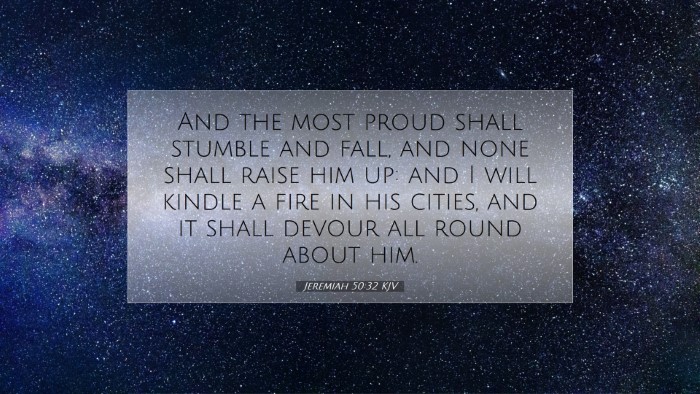Commentary on Jeremiah 50:32
Verse Context: Jeremiah 50:32 states, "And the most proud shall stumble and fall, and none shall raise him up: and I will kindle a fire in his cities, and it shall devour all round about him." This verse is part of a prophecy against Babylon, which symbolizes pride and rebellion against God.
Overview of Biblical Themes
In Jeremiah's prophecy, the verses often focus on the themes of judgment, pride, and divine retribution. This specific verse highlights the certain downfall of the proud, aligning with the Biblical principle that God opposes the proud but gives grace to the humble (James 4:6).
Insights from Commentaries
Matthew Henry's Commentary
Matthew Henry emphasizes the inevitable judgment upon the proud. He states that the pride of Babylon will lead to its downfall. Babylon’s pride was epitomized through its arrogance and disregard for God's authority. Henry comments on the divine justice, which ensures that "none shall raise him up," indicating that there would be no recovery for Babylon after its fall. Additionally, the fire represents God's consuming judgment that will annihilate the prideful cities, highlighting the power of God's wrath against ancient empires that defy His will.
Albert Barnes' Notes
Albert Barnes elaborates on the nature of the proud who will stumble and fall, suggesting that their confidence and security are unfounded. He notes that the pride of the nations will be their undoing, and this theme resonates through the history of Israel’s enemies. Barnes points out that God's sovereignty will ensure their demise, implying that their supposed strength is merely an illusion. The judgment depicted in this verse serves as a sobering reminder of the consequences of arrogance, both personally and nationally.
Adam Clarke's Commentary
Adam Clarke observes that the "most proud" can refer not only to individual leaders but also to the nation as a whole that has grown arrogant in its power and influence. He highlights that the prophetic message serves as a warning against both personal and corporate pride. Clarke connects the imagery of fire to the consuming nature of divine judgment, suggesting that just as fire eliminates impurities, God's judgment purges the prideful civilizations of their sinfulness.
Theological Implications
The verse serves as a reminder of the consequences of pride in the lives of individuals and nations. It underscores the Biblical teaching that God opposes the proud and offers salvation and grace to the humble. The image of stumbling and falling indicates the total collapse of that which stands against God, while the subsequent fire represents both purification and destruction.
Practical Applications for Pastors and Theologians
This commentary on Jeremiah 50:32 invites pastors and theologians to reflect upon the attributes of God, particularly His justice and sovereignty. It encourages ministers to guide their congregations in humility, teaching the dangers of pride. The call to personal and corporate repentance is vital, stressing a life surrendered to God's authority rather than one that seeks its own elevation.
- Emphasis on Repentance: Encourage congregations to seek humility before God and to acknowledge their dependence on Him.
- Preaching Against Pride: Incorporate teachings that highlight the destructiveness of pride, drawing from this verse as a warning.
- Prayer for Humility: Foster a community of prayer that seeks inner transformation reflecting true humility.
Conclusion
Jeremiah 50:32 is a powerful verse that encapsulates the prophetic warning against pride and the certainty of God's judgment. By combining insights from esteemed commentaries, we gain a deeper understanding of its implications for both the ancient context and contemporary application. This passage serves as a profound reminder of God's sovereignty and the ultimate futility of human arrogance.


